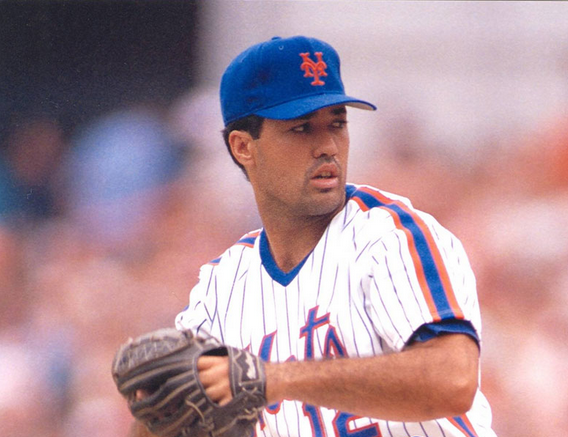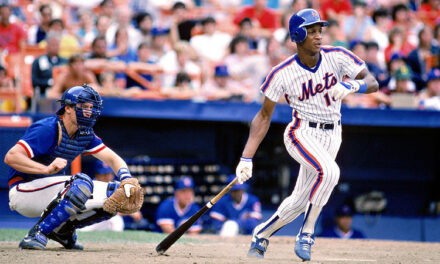For Ron Darling, it only made sense that the title of his latest book was called 108 Stitches.
There are 108 stitches on a baseball, one that he threw in 382 career major league games (364 of those starts) spanning a thirteen-year major league career with three different organizations.
The number 108 also pays homage to the number of regular-season wins the 1986 Mets won before defeating the Boston Red Sox in seven games for the club’s second World Series title.
In the third book by the New York Times bestselling author (and third with collaborator, Daniel Paisner), Darling connects and intertwines stories of the players and personalities he came across in nearly four decades in the game as a player and broadcaster.
108 Stitches: Loose Threads, Ripping Yarns, and the Darndest Characters from My Time in the Game traces the multitude of people that have come into Darling’s life who left their own stamp on the 58-year-old’s career.
Ever the master storyteller, Darling shares intimate anecdotes from his time on and off the field along within the broadcast booth to deliver an entertaining look into a career filled with interesting characters.
From getting to share drinks with and pick the brains of Mickey Mantle, Billy Martin and Whitey Ford at a Manhattan bar, to highlighting some of the wild personalities on the ’86 club which includes a claim of racist taunts from Lenny Dykstra to Red Sox starter Oil Can Boyd in Game 3 of the Fall Classic, to calling out the current Mets ownership for not honoring the team’s past, Darling holds nothing back in revealing tales using a bit of six degrees of separation.
The book also serves as a self-reflection for Darling’s past. As he’s recounting several of the anecdotes – with some more controversial than others – Darling contemplates what he could’ve done differently when it came to rookie Gregg Jefferies getting picked on in the Mets clubhouse, to an insensitive joke Darling made about Mookie Wilson on a bus ride, to the aforementioned Dykstra claim.
The book’s reflectiveness on such incidents during his early professional years helps to highlight his maturation over time. The stories allow the readers to be placed in the moment with Darling, to better understand his thought process and contemplate what they might have done in the same instance.
While some may take issue with the personal details exposed along with the treatment some of the players received in the book, Darling does heap praise for many of the coaches, teammates and broadcasters he’s worked with over the years.
Some of the more lighthearted stories have to do with mentorship (Al Jackson), praise (Gary Cohen, Kevin Mitchell, Dave Duncan), and downright humorous memories.
Darling’s latest work is a fun read that strings witty interactions, wild events and keen observations together which formed a successful and fulfilling major league career.
I had the privilege of speaking with Darling in early-April where we discussed the book, his initial reactions to being traded to the Mets and why he thinks fans have such a love for the Mets’ broadcast team.
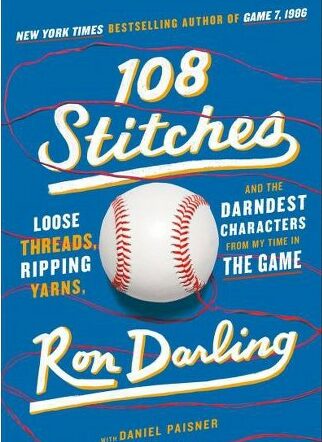
MMO: Your latest book, 108 Stitches, is a look back at the people and personalities you came across during your career with some great anecdotes. I loved how you connected players and stories and found common threads – what gave you the idea to go that route for this book?
Darling: 108 stitches are how many stitches are on a baseball and I played on a team that won 108 games, so I thought it might be good luck. What I wanted to do was interconnect all the stories and personalities 108 different ways, and that was my intent.
MMO: This is your third collaboration with Daniel Paisner. How did you initially meet and what’s been best about working on projects together?
Darling: I was going to work on my first book, The Complete Game, and I had written most of it but I certainly needed a more educated eye. I had been out of college for quite some time [Laughs] and I needed someone to help me with the commas and everything else and Dan was sent my way.
He and I ended up becoming great friends and I think we’re friends more than collaborators. Each and every time I’ve done one of these things it’s hanging out with a friend, which is a nice thing to have.
MMO: You write in the book about how then Texas Rangers manager Don Zimmer told you at the end of spring training in ’82 that you’d be the first up when Texas needed a starter. You wrote that you left to head for the Rangers minor league camp and by the time you arrived several hours later you found out you were traded to the Mets. Can you talk about your initial reactions to being dealt to New York?
Darling: Yeah, it was crazy. I got that information from Don Zimmer in Pompano Beach, Florida, four hours from Plant City, Florida (where the Rangers minor league camp was). By the time I got to the hotel in Plant City, in those days – and it’s probably hard for anyone young to imagine – the red light in my room was on which meant I had a message.
The message was from a person named Lou Gorman. I had known Lou as a high school player because he was from Rhode Island and I was from Massachusetts, so I figured he was just calling to say hello. I called him back and he said, “Ron, I just want to wish you congratulations. You’ve just been traded to the Metropolitans.”
I knew who the Mets were, but I had no idea who the Metropolitans were. I thought maybe I was traded to a soccer team!
It was interesting that the first call I got was from the Mets and the second call from the Rangers but it really gave me a clue of what the business side of baseball can be. You can be in one place and then four hours later you can be with a whole other organization.
I was initially kind of upset that I was traded because I was their number one pick and you have this feeling that you’re going to be the guy who changes the organization and now I’m traded. Zimmer told me that I was going to be in the big leagues pretty quick and Frank Cashen told me I was going to be in Triple-A all year with the Mets, so my initial reaction wasn’t great.
In retrospect, it ended up being the greatest place I could go to. We had some of the great pitchers and we all grew and got better as a team.

MMO: You mention several mentors from your career in your book, but dedicate quite a few pages to Al Jackson. Can you talk about that relationship with Jackson and how he impacted you at an early age in Triple-A?
Darling: Al Jackson was one of the craftiest left-handers that ever pitched in the game. He had a great screwball pitch. When I got to Triple-A he really let me know that becoming a major league pitcher was a J-O-B. He taught me that the people who work hard at their job end up being really great at their job. He took me under his wing and he worked me harder than I’d ever been worked before.
He put me in a mental kind of place where when I got on the mound I knew I was in better shape and I knew I was better prepared than the guy that I was going to face that day. I retold myself that lesson for each and every start I made for the rest of my career.
MMO: I’ve had the great fortune of speaking with several of your former ’86 teammates for the site, and whenever I ask them what made that team so special they all said that Davey Johnson knew how to utilize and put you guys in the best position to succeed. What are your thoughts on that and do you have any differing opinions as to what made your club excel like it did that year?
Darling: That definitely is 100 percent true from my teammates about what Davey did on the field. He also was a pretty good tactician once the game started, so he always gave us the best chance to win and there were some good managers in those days.
I think that for the younger fans who don’t know that team, I never played on a team that wanted to not only beat you, humiliate is too strong a word but you know where I’m going. If we were beating you 5-1 we wanted to beat you 10-1. If a hitter had three hits he wanted to get four. If a pitcher had struck out six he wanted to get to ten.
We were not only able to be excellent but coexist which doesn’t always happen. What I’ll remember about that team is we were on a quest to be one of the greatest teams ever and I never played on a team that was quite like that.
MMO: At what point from the time you were traded to the Mets in 1982 but before the ’86 season did you realize that something special was happening and that it was only a matter of time before you guys all broke out together?
Darling: I hadn’t seen Dwight [Gooden], he was in Low-A when I was in Triple-A so I didn’t know how excellent he was. It was the time Darryl Strawberry was called to Triple-A. He had spent the past season at Double-A, he came up I believe in 1982. That season we were playing a postseason game in Rochester and in Rochester at that old stadium they had the highest fence you had ever seen with tons of advertisements that seemed as high as the Green Monster but a lot deeper.
Straw came up in one of his first at-bats and hit a home run over all of that. And right-handed hitters never hit the ball over that! That was when all of us said, okay, we have the best player in the land. Where are we going to go from here?
For people that don’t remember the early to late eighties, the Mets minor league teams were doing stuff at historical rates in winning championships in Triple-A and Double-A. Winning players were abound in that organization at that time.
MMO: When looking at your stat line from 1985 to 1986, a few things stood out. You cut down your walk rate by more than two percent and increased your strikeout percentage by three percent. Were there any mechanical or physical changes you made heading into 1986 that resulted in one of the finest seasons of your career?
Darling: There definitely were some subtle things that I changed mechanically that really helped me put the ball in the strike zone but I think it really was a mental thing. What happens for a young player is that pitchers can do some amazing things but until you believe that you can be an elite or good pitcher it’s hard for you to become one.
I pitched a big game against the Cardinals late in the season (1985), and that gave me the confidence going into the next season that I was good enough, that my stuff was good enough and I could be aggressive and go after hitters. Once I did that it changed my whole mindset, it changed my teammates’ mindset on how much they could count on me and that combination of knowing that you could be good and your teammates thinking that you gave them as much chance to win as Dwight Gooden gave me a big leap of confidence.
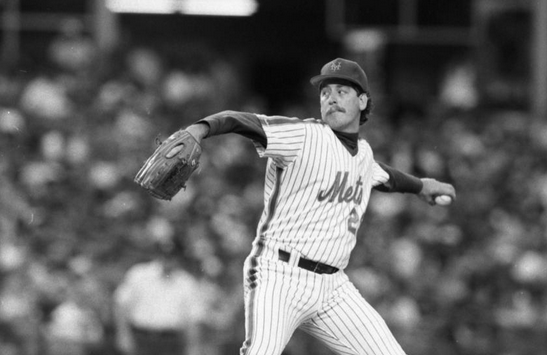
MMO: A teammate you mention in the book is Frank Viola, who you matched up against in the greatest pitched collegiate game ever in 1981 between Yale and St. John’s. What memories stand out for you from that game, and did you and Viola ever break down that match-up once you became teammates?
Darling: No, we never broke it down. It was such an interesting experience I don’t think either of us wanted to tarnish it in any way by talking about it. I think it’s interesting that the greatest game I ever pitched in my life, I lost. That puts me with Harvey Haddix and some others.
The many things I take out of that game was we thought the world of St. John’s; we thought we’d get embarrassed that day and we didn’t. Second, to pitch against Frank and then become his friend was a great story in my life. And to show how classy the St. John’s team was after I had given up the first hit to Steve Scafa in the 12th, their entire team came on the top step of the dugout and gave me a standing ovation. I don’t know if that’s ever happened in a collegiate game and I’ll never forget it.
MMO: In a chapter, you write about having to go see Dr. Lewis Yocum in 1992 after posting a string of bad outings. He suggested Tommy John surgery but you passed. Instead, you write that it allowed you to reinvent yourself as a pitcher. Can you talk a bit about your decision back then to forgo the surgery and the approach you took?
Darling: There were a lot of things in my corner, one was that I had a really good team to pitch for in the Oakland A’s with Tony La Russa and Dave Duncan. I had Dave Duncan in my corner who had a great way of deciphering how to get hitters out with the stuff you had. I really thought it was going to be the end of my career and I didn’t want to go out with a whimper. I thought at that point my stuff had been so reduced that even if I had Tommy John surgery what I came back with would still be about the same reduction and physical gifts so I decided with the ability of pharmaceuticals and a great training staff to push through it.
I would equate it to probably what some guys like Masahiro Tanaka had to go through: a compromised UCL. It wasn’t like I was John Wayne or anything, there was pain but once I knew it was compromised I didn’t worry about it anymore. I didn’t care that it was hurt or compromised and the rest of that season I ended up pitching fifteen games and pitched some of the best games I ever pitched in my career.
MMO: At what point in your life did you realize that you wanted to get back in the game with broadcasting?
Darling: We are all betrayed by the calendars as athletes and it’s time to go. Almost all of us are very bad when it ends. I think there’s a period where you mourn for yourself and you are angry at the game. There’s this two-three-four-five year period where you don’t really want to watch the game. I remember during those years from 1995-00 I didn’t watch the postseason or the World Series. If I saw a game happening on a side field today I might pull up and watch a couple of innings. Then I wouldn’t pay it any mind.
But then I was asked to do some television work in Los Angeles and it was a perfect time in my regular life to do it. And once I started doing it I realized what a passion I had for the game. It was something my father taught me and that my mother – who was a great athlete – was good at. It was something that had been such a big part of my life and it has not changed.
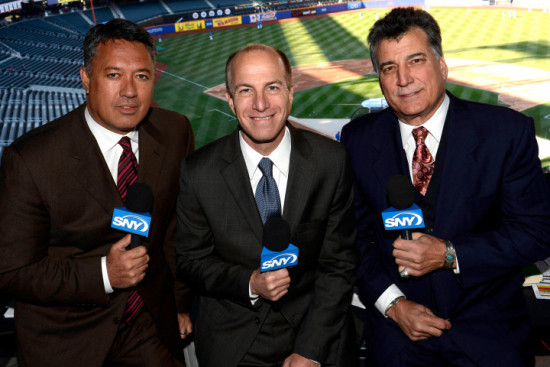
MMO: Fans – including myself – hold your broadcast team in the highest regard. Why do you think fans have such an affinity for yourself, Keith, and Gary?
Darling: Boy, I don’t know. I think we’re a strong group. I think if I’m going to put anyone in the highest echelon I think Gary Cohen is the finest play-by-play man that has ever existed, that’s how good he is. Also in his job with the Mets, he’s such a good caretaker and fan of that history.
Then you have two guys who are good friends that really treat the broadcast as two guys watching from their couch. I know that’s cliché and people will say that’s how a broadcast should be, but Keith and I take it to sometimes a silly art form in the way we do it.
I think the third part of it is that when we’re at our best we’re like free form jazz, and what I mean by that is there’s no ego in the booth. If Keith is rocking and rolling that night, it’s Keith’s night. If Gary’s rocking and rolling like in the Johan Santana no-hitter, it’s his night. Occasionally I have my nights.
I think we spend every single time in the booth always trying to help each other get through a story, a musing, an anecdote, and helping each other as opposed to just not pulling a lifeline out there and helping each other. That takes care of the traffic in a three-man booth and it also gives all different kinds of perspectives to the story and I think that’s maybe why we do all right.
MMO: At the end of the book you touch on the current state of the game, including the increased reliance and usage of analytics. As a cerebral pitcher, I’m curious as to how you think you would’ve embraced or perhaps not, the current metrics if they were available to you during your career?
Darling: I would’ve thrived with it but I think I would’ve crossed paths with it at times because I don’t think all the analytics belong on the Ark of the Covenant. I think some are very, very good and I think some are like any other information. Not only do you have to see what’s worthy but what you can understand and what you can work into your game. There’s some stuff that is really relevant but it won’t really help your game because you don’t have the ability physically and mentally to put it into your game.
That would be the real struggle but I certainly would’ve thrived in the game and I think the only thing that I want to make sure in analytics is that all the numbers are very important, the process is very important, but don’t forget the immediacy of winning tonight. I know that over the process of a complete season these things might happen but on a Wednesday night after you’ve lost three in a row sometimes you have to get off that page because you need this game so badly. Those are the things to me that I find interesting.
MMO: Obviously you share a lot of great anecdotes involving many different players you played with and against during your career. Did any particular story give you pause about including it in the book? Or were you comfortable sharing all the particular details that you did?
Darling: I think there were 200 or more stories that I had for the book and I had to pare it down to 108. Like I said in the beginning, each one had to be interconnected with the personalities; certainly, some are more controversial than others.
But if the entire book is read it’s a feel-good book about what it’s like to live a life that I’ve led which is incredibly lucky. When I was a ballplayer almost every morning I got up I never thanked my lucky stars. I never did it before as a player but I always do it now.
MMO: I have a pop culture question for you: How did you come to secure the role as Li’iBoy in the film Shallow Hal?
Darling: That’s a great, great story. The Farrelly Brothers – with Peter [Farrelly] famous now because he’s an Oscar winner with Green Book – Peter and Bobby were known for their silly, crazy, funny movies. They had seen a Hawaiian kid on vacation in Hawaii and both of them looked at each other and said, “He’s in our next movie.”
They commandeered him to North Carolina, he did his part in the movie and then because of the nature of Shallow Hal where one person looking one way and one person looking the other way they said to themselves, “How we can we find a decent looking Hawaiian boy?”
After a search, they said, “Isn’t that guy who used to pitch for the Mets, Ronnie Darling, of Hawaiian descent?”
They found out that I was and that’s how I got the part. But as you can see, my acting skills aren’t so great and they had to dub my Hawaiian accent because growing up in Massachusetts I didn’t have one.
MMO: You grew up in Massachusetts as a Red Sox fan, and then obviously started against them three times in the ’86 Series. Once you’re a professional athlete, is it difficult to separate the fandom from your loyalty to the club you’re now with?
Darling: You know, when you’re paid from a team you are completely in. [Laughs.] Your memory of what team you liked as a child completely goes away when the check you get twice a month has the name of your team on it. You lose complete allegiance. I never thought of the Red Sox when I was a professional player because of the commitment to the organization that you’re in.
MMO: Thank you so much for some time today, Ron. Best of luck with the book!
Darling: Thank you so much. I appreciate it.
Follow Ron Darling on Twitter, @RonDarlingJr


